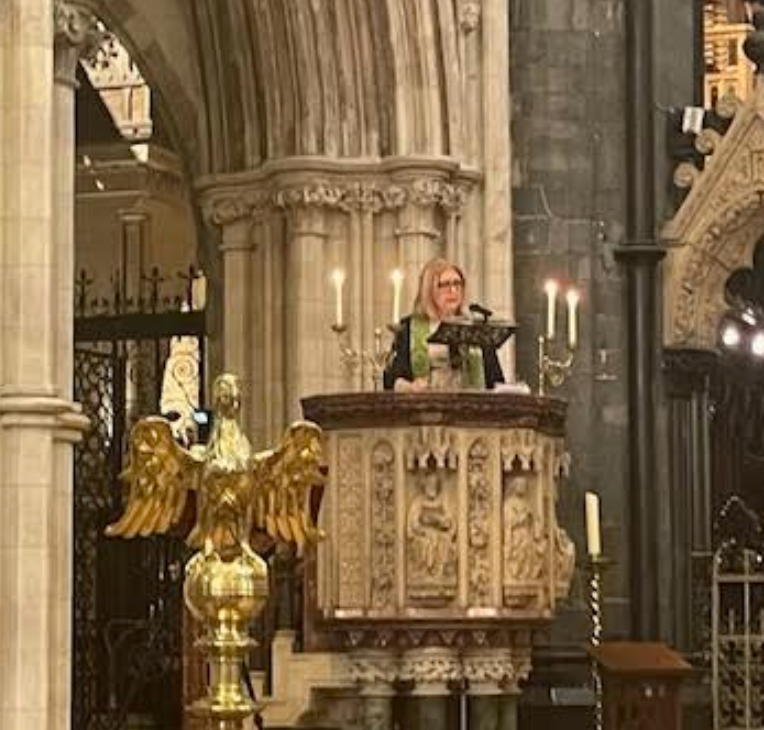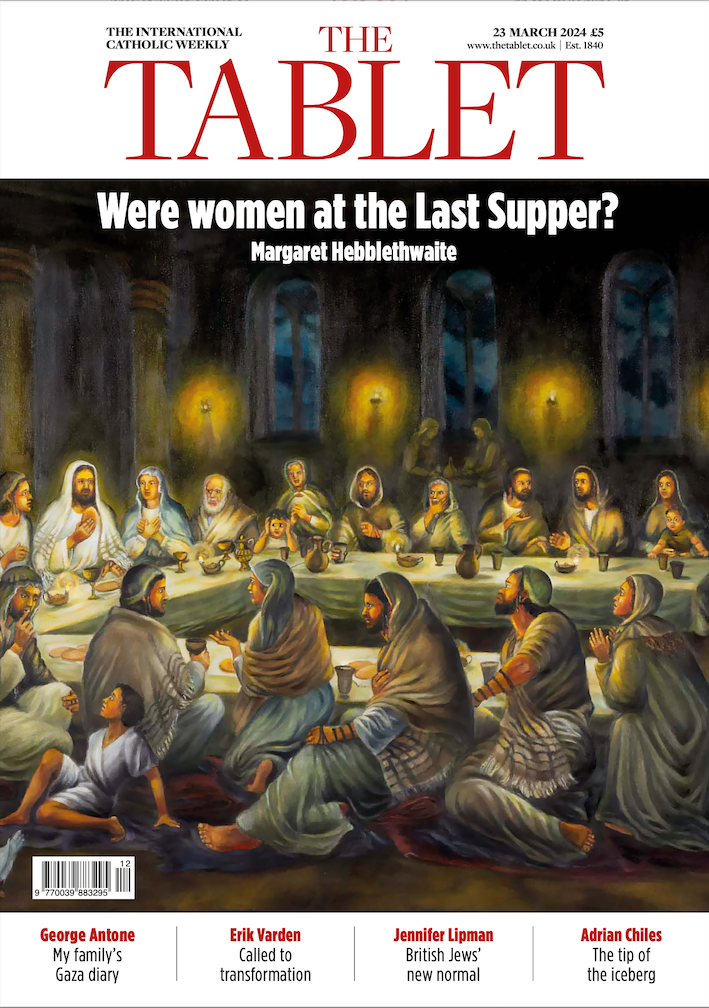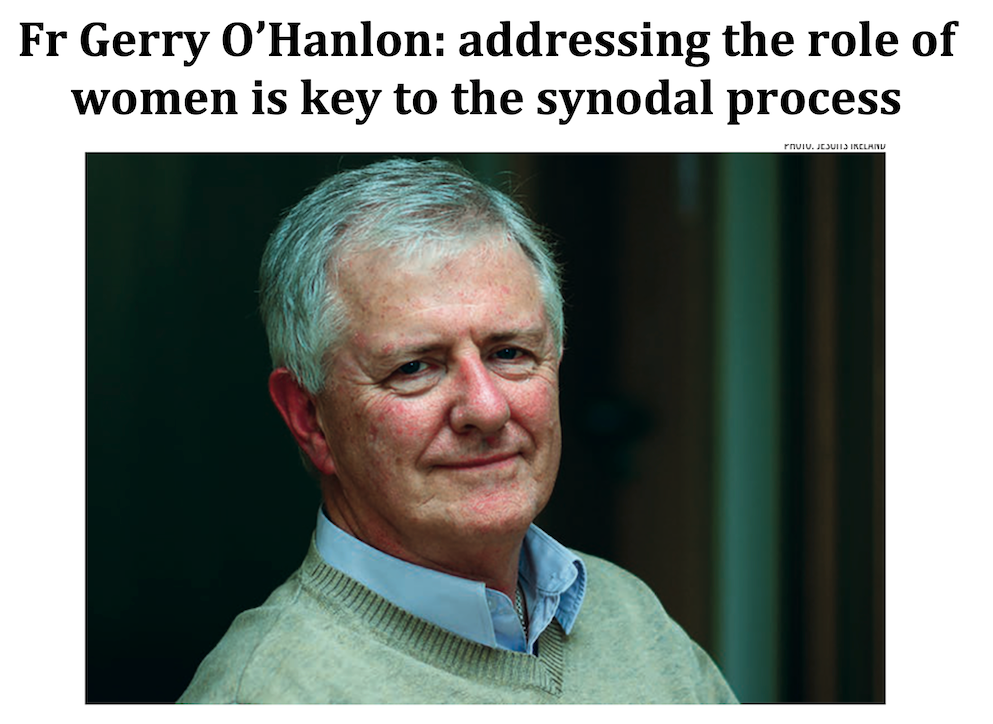Blog Layout
Mary's Magnificat (Luke 1:46-55)
Soline Humbert • 20 October 2020
Homily preached on the 20th of September 2020 at the Women’s Ordination Worldwide Liturgy
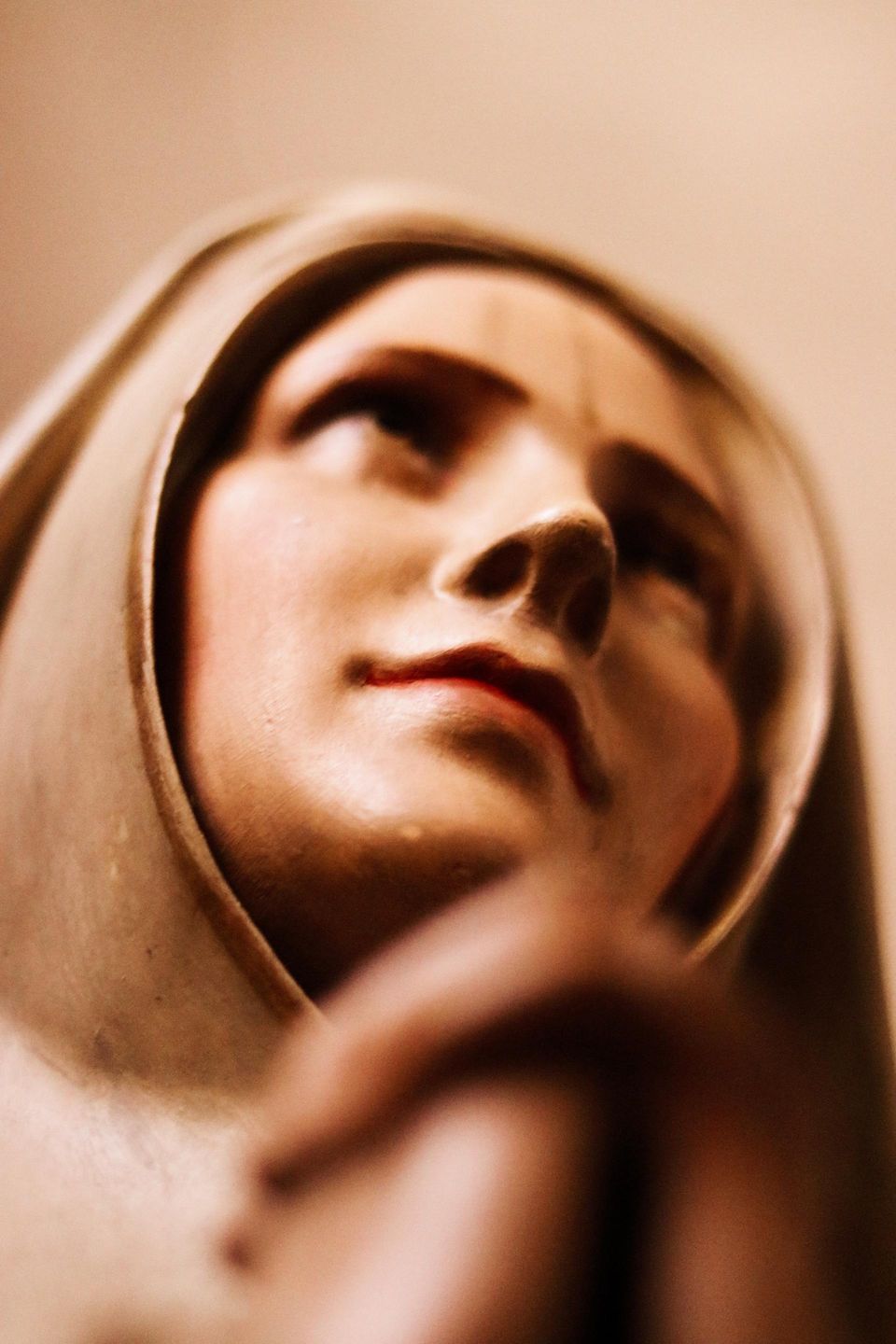
I dedicate this homily with gratitude to the memory of Saint Thérèse of Lisieux, Doctor of the Church, who wrote: “How much I would have wanted to be a priest so that I could preach on the Blessed Virgin Mary.”
Mary’s Magnificat (Luke 1:46-55)
''I allow no woman to teach or to have authority over men. Let them be quiet.'' (1 Tim 3:11-12)
Whoever wrote these lines (attributed to St Paul) had obviously not heard Mary singing her Magnificat at the top of her voice! The Evangelist Luke is not giving us a quiet, submissive Mary.
She is not singing softly a lullaby to lull us to sleep. Here Mary is a prophet issuing a wake up call, loudly proclaiming a revolution. Mary is not rocking a cradle, she is rocking the world. She will not be silenced. She is a woman possessed: possessed by the Divine Breath, the Holy Spirit. The Magnificat is a song of praise, of thanksgiving and a profession of faith. It exudes joy, power and hope. Mary is filled to overflowing. A new wineskin for the New Wine. The words surge onto her lips. Two thousand years on and they still flow on like a great river. They are both our inheritance and our mission.
Mary tells us: This is who God is, and this is what God has done, is doing and will do. The God of Mary is not a distant detached God endorsing from afar the unjust status quo. No, the God of Mary of Nazareth is a God intimately involved in the world and whose action is truly subversive.
But let's be clear: Mary is not proclaiming a bloody, violent revolution where places are merely reversed and nothing really has changed. The same dynamic of competition, envy, greed, powerplay and domination remains untouched. Mary's Magnificat is far more radical: It heralds a total transformation of relationships through justice and mercy. This is what the reign of God, the reign of Love looks like.
The Magnificat tells us that the world is in the process of being re-made, re-created, re -ordered. Distorted relationships are giving way to relations of equality, mutuality and solidarity.
Mary is a visionary. She sees beneath the appearances. She sees a different reality than what meets the eye. She sees the Spirit at work in the foundations of life, bringing to birth justice, peace and love.
This is the Good News.
When, under the impulse of the Spirit, we join Mary in our Yes to God we open a passageway for new life to flow in us and through us. That life bears fruit, lasting fruit. New forms emerge, the impossible becomes reality.
Mary is solidly rooted, anchored in her people, she is mindful of her ancestors. She remembers the past but she is not locked in it. She remembers God 's promises, God's faithfulness. Her experience of the strength of that bond, of that covenant is the basis for her trust. She knows, intimately, that God is Emmanuel, God with us and for us. Because God is faithful there is hope and there is a future. The God of promise is the God of fulfilment.
Mary exults. She jubilates with God's own joy. Her jubilation is both mystical and prophetic, intimate and cosmic. That joy is truly expansive and explosive. It opens up spaces, unlocks doors, disrupts, goes beyond imposed limitations.
Can we too make space in our hearts for that divine rejoicing? A rejoicing not because we are smug and things are going well in our little bubble and we are indifferent to the immense suffering in our world, but a rejoicing because God is God. That is a truly revolutionary joy.
In a church where unjust, unequal power relationships have been sacralised, especially on grounds of gender, Mary's Magnificat is a call to look again. These structures, these teachings, these roles, these stereotypes, these exclusions are the products of a distorted image of God which has prevailed through millennia. The gender apartheid in our church is no more godly than the racial apartheid was in South Africa, and truly no less a scandal. A scandal in the biblical sense, an obstacle to the Gospel. Mary 's Magnificat exposes it for what it is: not the good fruit of God 's will and action, but the rotten fruit of sexism and misogyny.
As I prepared these reflections, some of the glaring absurdity in our present ecclesial practices came to mind: Mary's Magnificat is from the Gospel, meaning that at Mass when it is read it has to be by a male priest or a male deacon. Today Mary wouldn't be allowed to proclaim her Magnificat in our churches ...but she would have to hand it over to be delivered through male, ordained, lips! And as for preaching on it, she would also be considered unfit because of her gender.
What have we done with the God of Mary 's Magnificat? Turned into a male idol to give some men power over women in the guise of divine male authority.
Mary of Nazareth proclaimed the gestating Christ with authority. Mary of Magdala proclaimed the same Christ now risen with authority. Their yes to God the source of their authority, not male permission and approval. Free women, empowered and empowering women. Women alive and on fire.
Hildegard of Bingen, Doctor of the Church, whose prayer was read earlier, was another such prophetic, visionary woman. She too refused to keep quiet. She had things to tell, Good News to proclaim. Her God, Lady Wisdom, is at work and at play in all of creation. Hildegard reminds us that we are an integral part of that web of life, sustained by the one Spirit of love. She too rejoices in the marvellous work of creation and re-creation, calling us to just relationships with all creatures.
When she prays ''Make us into waving fronds so that we may dance before you in joy,'' I visualize Mary dancing her Magnificat. Will we let ourselves join in that divine dance, that dance of freedom and joyful hope?
Together with Mary and Hildegard, Elizabeth and Mary of Magdala, and countless witnesses, women and men, we affirm.
With You among us, we are holy people.
Within your embrace the land is holy.
All created things live your praise.
We hear, we see, we are in awe
And we give thanks.
Magnificat!
Soline Humbert (Vatinel)
solinehumbert@yahoo.ie
Share
Tweet
Share
Mail
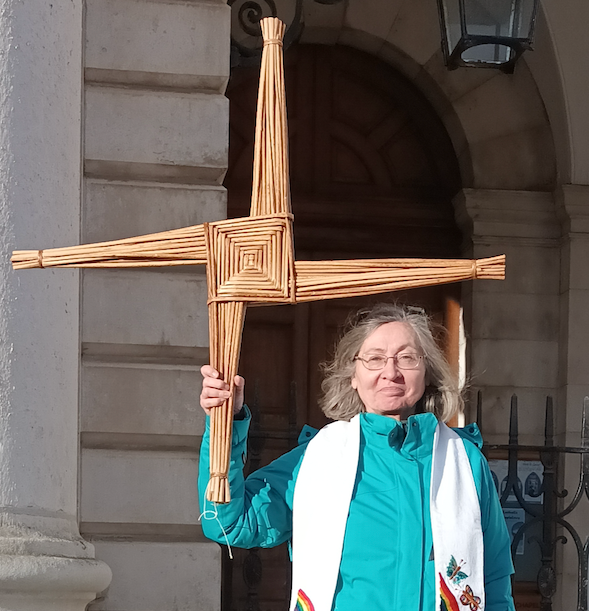
by Soline Humbert
•
25 February 2025
A reflection by Soline Humbert for the Women’s Ordination Conference Retreat “Hidden Springs, Holy Radiance” 9 February 2025 [ see recording on YouTube https://www.youtube.com/watch?v=szP5h1kzEsU ] We have been gathering over the past three days in the presence of Brigid of Kildare, and I am sure she has brought gifts to each one, for my experience is that she is attentive to our needs and very generous with her help. At this stage I just want to share some of my own life journey with Brigid. I first encountered her in 1969 when I came from France to Ireland as a child on holidays to learn English. I went to a small Irish town called Tullow. As it happens it was in Tullow that on the first of February 1807 the order of nuns of St Brigid which had been dissolved at the Reformation, had been refounded by a far-sighted bishop. Symbolically an oak sapling had been brought from Kildare Town, from the church of the oak, to Tullow and planted in the grounds of the Brigidine convent where I took English classes. It was by then a majestic oak tree. It still stands to this day. Coincidentally and somewhat ironically, 1969 was also the year that Pope Paul the 6th removed St Brigid, along with 193 other saints, from the Universal Roman Calendar of saints. The reason being that there wasn’t enough evidence for her existence! That despite the fact she was the most mentioned Irish person in the writings of several centuries after her death... What was true was that her flame had been somehow extinguished, and her importance diminished in a deeply clericalised and patriarchal church as Ireland was at the time. She was in the shadow of St Patrick and very much the secondary patron Saint, reflecting the secondary position of women in general. But change was slowly happening. Having discovered in myself a vocation to the priesthood I eventually co- founded a group for women’s ordination and launched a petition to open all ministries to women in February 1993. At the very same time, which I consider providential, the flame of St Brigid was rekindled by the Brigidine sisters in Kildare Town. Women were stirring after a very long wintertime in the church and in society and becoming more fiery. Brigid with her torch was blazing a way for equality. It is then, and only then, that I came across the story of her ordination as a bishop and I remember my astonishment for I had never read anything like that before, or since, for that matter. Of course, while this fact was mentioned in many of the lives of Brigid going back to the first millennium it had been quietly left out of the pious descriptions of her life which were fed to the people. The way the story is recounted makes it clear that her ordination was considered to be very much the doing of the Holy Spirit. Objections about her gender were voiced but powerless to negate what God had done. It reminds me very much of the passage in the Acts of the Apostles when St Peter is amazed to discover that the Holy Spirit has descended on Cornelius, a gentile, and which leads him to conclude that “God has no favourites”. Brigid’s episcopal ordination at the hands of a bishop overcome by the Spirit is also a powerful affirmation that when it comes to ordination God has no favourite gender. Her ordination’s divine origin shows that Brigid was a bishop because God ordained it, and her. A very subversive truth our Church has yet to learn... As we campaigned for women’s ordination we made sure that this episode from Brigid’s life was brought into the open, again and again, despite clerical efforts to dismiss this dangerous historical memory as pure legend and keep it buried. Interestingly when the Anglican Church of Ireland, (Episcopalian) ordained their first woman bishop in 2013 it was to the diocese of Meath and Kildare! A very symbolic act. I have often gone to St Brigid’s Well in Kildare, a little oasis of peace, to spend some time with Brigid and re-source myself by the gently flowing water. After the First Women’s Ordination Worldwide Dublin international Conference in 2001 I went there again on the anniversary of my baptism and I hung my purple stole on a tree overlooking the well. I had worn that stole for many years as a sign of waiting. From now on I would wear stoles of other colours. And a few years ago, I found myself back in Tullow, as a guest speaker at the invitation of the Brigidine sisters for an international celebration. It was very moving to be able to speak of my calling to priesthood in the place where the order of St Brigid had been revived and where I had first come as a child half a century beforehand! That day I sensed very much the presence of Brigid the bishop and I was filled with joy and gratitude. In some ways we can say St Brigid has risen up and is leading the way for women to rise up. Although a woman in what was very much a man’s world and a man’s church, Brigid exudes a remarkable confidence in her being, in her words and in her actions. No doubt that confidence was rooted in a deeply contemplative life nurtured by prayer. “From the moment I first knew God, I have never let him out of my mind, and I never shall”. She embodies the authority which stems from being filled by the Spirit and a leadership at the service of peace, justice, hospitality to the strangers, charity to the poor and marginalised, reconciliation, healing and harmony with creation and care of the earth. The two Scripture readings we have just heard are very fitting for she was renowned for her practical care and generosity to those in need or suffering. Like Christ, she went around doing good. I must not be the only one who saw and heard in Episcopalian bishop Mariann Budde’s recent words the spirit of St Brigid as she used her God- given authority to plead for mercy for the people in vulnerable situations in the face of unbounded cruelty. Brigid is a bold, dynamic presence. She is said to be a woman of the threshold, of liminal places, and she is a sure guide for our times when we also are in transition on the threshold of a new church and a new world too. She calls to us to step boldly forward with our torches burning brightly, bringing the light and warmth of God’s Love to a world gone cold in the grip of darkness and despair. Her life reminds us that with “God nothing is impossible” and to expect miracles. I shall end on a light- hearted note: I went on pilgrimage to St Brigid’s Well and Solas Bhride in Kildare last Tuesday to prepare for this retreat. On the way back from the well and driving through the wide expanse of the Curragh where thousands of sheep graze freely I started seeing a multitude of rainbows. It reminded me of one of the many whimsical stories about Brigid: Caught in a rainstorm, she hangs her mantle on a sunbeam to dry. Dripping from its edges, colourful rainbows form in the water droplets, and her mantle is ‘bright’ with colour. Lady, from winter’s dark, Star of Imbolc, rise! Dance across our threshold: Scattering warm laughter Seeds of hospitality, Tolerance, forgiveness! Return again to the folk: You the Spring we yearn for! (Tom Hamill)

Women are a problem for the Catholic Church, an institution with ingrained misogyny - Soline Humbert
by Colm Holmes
•
4 November 2024
Papal plámás is no substitute for an end to discrimination against women
About us
We are working to develop inclusive communities based on our 6 Aims, while being open to engage with all sections of the church about our lives in the church today.
Contact Info

by Soline Humbert
•
25 February 2025
A reflection by Soline Humbert for the Women’s Ordination Conference Retreat “Hidden Springs, Holy Radiance” 9 February 2025 [ see recording on YouTube https://www.youtube.com/watch?v=szP5h1kzEsU ] We have been gathering over the past three days in the presence of Brigid of Kildare, and I am sure she has brought gifts to each one, for my experience is that she is attentive to our needs and very generous with her help. At this stage I just want to share some of my own life journey with Brigid. I first encountered her in 1969 when I came from France to Ireland as a child on holidays to learn English. I went to a small Irish town called Tullow. As it happens it was in Tullow that on the first of February 1807 the order of nuns of St Brigid which had been dissolved at the Reformation, had been refounded by a far-sighted bishop. Symbolically an oak sapling had been brought from Kildare Town, from the church of the oak, to Tullow and planted in the grounds of the Brigidine convent where I took English classes. It was by then a majestic oak tree. It still stands to this day. Coincidentally and somewhat ironically, 1969 was also the year that Pope Paul the 6th removed St Brigid, along with 193 other saints, from the Universal Roman Calendar of saints. The reason being that there wasn’t enough evidence for her existence! That despite the fact she was the most mentioned Irish person in the writings of several centuries after her death... What was true was that her flame had been somehow extinguished, and her importance diminished in a deeply clericalised and patriarchal church as Ireland was at the time. She was in the shadow of St Patrick and very much the secondary patron Saint, reflecting the secondary position of women in general. But change was slowly happening. Having discovered in myself a vocation to the priesthood I eventually co- founded a group for women’s ordination and launched a petition to open all ministries to women in February 1993. At the very same time, which I consider providential, the flame of St Brigid was rekindled by the Brigidine sisters in Kildare Town. Women were stirring after a very long wintertime in the church and in society and becoming more fiery. Brigid with her torch was blazing a way for equality. It is then, and only then, that I came across the story of her ordination as a bishop and I remember my astonishment for I had never read anything like that before, or since, for that matter. Of course, while this fact was mentioned in many of the lives of Brigid going back to the first millennium it had been quietly left out of the pious descriptions of her life which were fed to the people. The way the story is recounted makes it clear that her ordination was considered to be very much the doing of the Holy Spirit. Objections about her gender were voiced but powerless to negate what God had done. It reminds me very much of the passage in the Acts of the Apostles when St Peter is amazed to discover that the Holy Spirit has descended on Cornelius, a gentile, and which leads him to conclude that “God has no favourites”. Brigid’s episcopal ordination at the hands of a bishop overcome by the Spirit is also a powerful affirmation that when it comes to ordination God has no favourite gender. Her ordination’s divine origin shows that Brigid was a bishop because God ordained it, and her. A very subversive truth our Church has yet to learn... As we campaigned for women’s ordination we made sure that this episode from Brigid’s life was brought into the open, again and again, despite clerical efforts to dismiss this dangerous historical memory as pure legend and keep it buried. Interestingly when the Anglican Church of Ireland, (Episcopalian) ordained their first woman bishop in 2013 it was to the diocese of Meath and Kildare! A very symbolic act. I have often gone to St Brigid’s Well in Kildare, a little oasis of peace, to spend some time with Brigid and re-source myself by the gently flowing water. After the First Women’s Ordination Worldwide Dublin international Conference in 2001 I went there again on the anniversary of my baptism and I hung my purple stole on a tree overlooking the well. I had worn that stole for many years as a sign of waiting. From now on I would wear stoles of other colours. And a few years ago, I found myself back in Tullow, as a guest speaker at the invitation of the Brigidine sisters for an international celebration. It was very moving to be able to speak of my calling to priesthood in the place where the order of St Brigid had been revived and where I had first come as a child half a century beforehand! That day I sensed very much the presence of Brigid the bishop and I was filled with joy and gratitude. In some ways we can say St Brigid has risen up and is leading the way for women to rise up. Although a woman in what was very much a man’s world and a man’s church, Brigid exudes a remarkable confidence in her being, in her words and in her actions. No doubt that confidence was rooted in a deeply contemplative life nurtured by prayer. “From the moment I first knew God, I have never let him out of my mind, and I never shall”. She embodies the authority which stems from being filled by the Spirit and a leadership at the service of peace, justice, hospitality to the strangers, charity to the poor and marginalised, reconciliation, healing and harmony with creation and care of the earth. The two Scripture readings we have just heard are very fitting for she was renowned for her practical care and generosity to those in need or suffering. Like Christ, she went around doing good. I must not be the only one who saw and heard in Episcopalian bishop Mariann Budde’s recent words the spirit of St Brigid as she used her God- given authority to plead for mercy for the people in vulnerable situations in the face of unbounded cruelty. Brigid is a bold, dynamic presence. She is said to be a woman of the threshold, of liminal places, and she is a sure guide for our times when we also are in transition on the threshold of a new church and a new world too. She calls to us to step boldly forward with our torches burning brightly, bringing the light and warmth of God’s Love to a world gone cold in the grip of darkness and despair. Her life reminds us that with “God nothing is impossible” and to expect miracles. I shall end on a light- hearted note: I went on pilgrimage to St Brigid’s Well and Solas Bhride in Kildare last Tuesday to prepare for this retreat. On the way back from the well and driving through the wide expanse of the Curragh where thousands of sheep graze freely I started seeing a multitude of rainbows. It reminded me of one of the many whimsical stories about Brigid: Caught in a rainstorm, she hangs her mantle on a sunbeam to dry. Dripping from its edges, colourful rainbows form in the water droplets, and her mantle is ‘bright’ with colour. Lady, from winter’s dark, Star of Imbolc, rise! Dance across our threshold: Scattering warm laughter Seeds of hospitality, Tolerance, forgiveness! Return again to the folk: You the Spring we yearn for! (Tom Hamill)

Women are a problem for the Catholic Church, an institution with ingrained misogyny - Soline Humbert
by Colm Holmes
•
4 November 2024
Papal plámás is no substitute for an end to discrimination against women
00353 86 8151054- John
info@wearechurchireland.ie
For merchandise:
We Are Church Ireland
C/O 49 Rockfield Avenue,
Perrystown,
Dublin 12.
D12H6F6
Ireland
We Are Church Ireland
C/O 49 Rockfield Avenue,
Perrystown,
Dublin 12.
D12H6F6
Ireland







